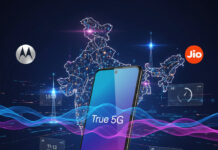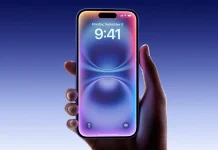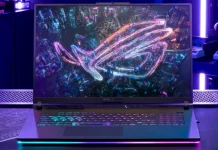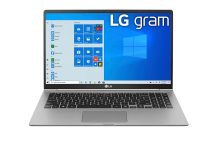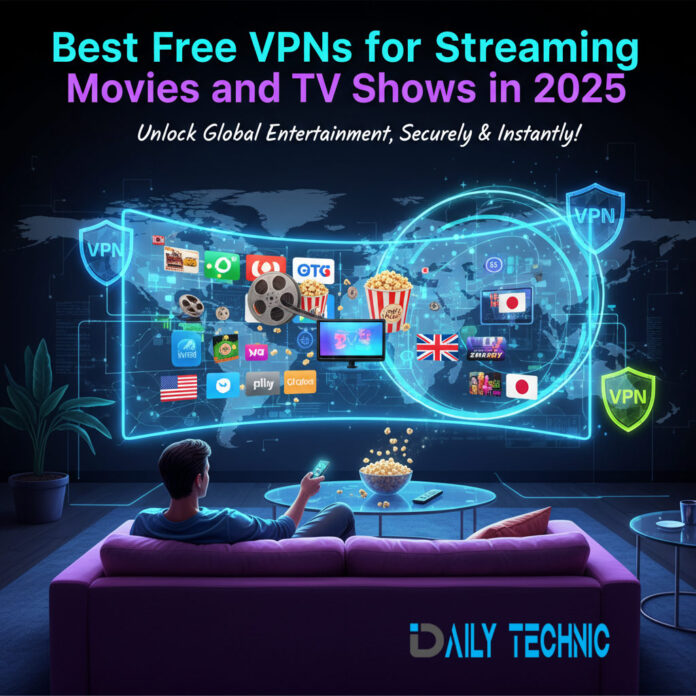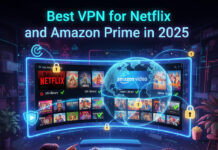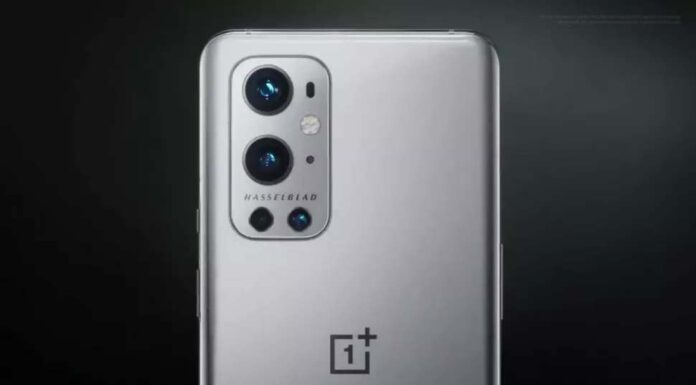Streaming should be simple: pick a movie, hit play, enjoy.
But in reality, it doesn’t always work that way.
You open Netflix or Amazon Prime, search for a title you’ve been waiting to watch… and then you see the message: “This title isn’t available in your region.”
Or your internet provider silently slows down your connection, and your HD movie turns into a blurry mess.
That’s when most people start asking:
- Is there a free VPN that actually works for streaming movies and TV shows?
- Can I really use it with Netflix, Amazon Prime, or other platforms without constant errors and buffering?
In this guide, we’ll walk through the best free VPN options for streaming movies and TV shows, what you can realistically expect from them, and when it might be time to consider a paid VPN instead.
What You Really Need in a Free VPN for Streaming
Before we mention any names, let’s be honest about something:
There is no perfect free VPN for streaming.
Free services always come with trade‑offs. The question is: are the trade‑offs acceptable for your usage?
Here are the key things that matter when you’re looking for a free VPN for streaming.
1. Speed and Bandwidth
Streaming is one of the most demanding things you can do on your connection.
If your VPN is too slow, you’ll see:
- Constant buffering
- Resolution dropping from HD/4K down to something barely watchable
- Audio and video are going out of sync
2. Server Locations
Let’s be real—one of the biggest reasons folks grab a VPN for streaming boils down to this:
- They just want to tap into content libraries from places like the US, UK, or Japan
- They’re fed up with that annoying “not available in your region” message, especially when they know the movie or show is out there somewhere
Basically, the more server spots a VPN throws your way, the higher your chances of landing on one that’s:
- Quick enough to keep up with HD or 4K without lagging
- Still dodging the blocks from streaming sites (you know how they love hunting down VPN connections like it’s a game)
But here’s the catch with free plans—they’re pretty stingy here:
- You might only get a small handful of locations, like maybe 2 to 5 countries at most
- And forget about those fancy “streaming-optimized” servers; those are usually reserved for the paying crowd
Bottom line: sure, a free VPN lets you pretend you’re in another country. But don’t count on a ton of choices lighting up your screen like a global adventure map.
3. Data Limits (Caps)
Ah, this is the part where free VPNs often shift from “hey, this is kinda handy” to “okay, this is getting annoying” for anyone who loves streaming.
Pretty much all free options slap some kind of limit on your data usage. Common ones include:
- 5 to 10 GB for the whole month, or
- A super-restrictive daily cap of about 500 MB to 1 GB
To give you a sense of how that plays out in real life:
- Popping on an HD movie? Bam, that could eat up 2 to 3 GB in one go
- Binge a couple episodes of your go-to show, and poof—you’ve probably just maxed out your monthly freebie
So yeah, a free VPN can totally work if you’re the type who:
- Only streams every now and then
- Wants to dip your toes in and see if VPNs are even your thing
But if you’re more like:
- The weekend warrior who devours entire seasons in one sitting
- Someone who fires up a stream nearly every evening
it’s probably not gonna hold up. In a nutshell: free VPNs handle the casual stuff fine, but they’re not designed for folks who treat Netflix like a second home.
4. Privacy and Security
Look, even if your vibe is just “I wanna chill and watch some shows,” you can’t totally ignore the privacy angle—it’s sneaky important.
The thing is, “free” VPNs gotta pay the bills somehow, and not everyone’s method is user-friendly. Some might:
- Hit you with a barrage of ads (and yeah, sometimes they’re super pushy)
- Quietly log and sell off your browsing habits to marketers
- Sneak in extra apps or toolbars that you didn’t sign up for (and who has time for that?)
When you’re shopping around for a free VPN, do yourself a favor and check for:
- A straightforward privacy policy that’s actually easy to read (not some maze of lawyer-speak meant to confuse you)
- Reliable encryption like AES-256 to keep things locked down
- A trustworthy name with a solid setup—think companies that also sell paid plans, so they’re not desperate for shady side hustles
And if you come across one that’s 100% free, no upgrades available, and it’s bragging about “unlimited everything” without saying how they stay afloat? That’s a big ol’ red flag—steer clear.
5. Device and App Support
Pause for a minute and picture your typical streaming setup:
- Maybe it’s your Android phone or tablet on the couch
- Or an iPhone/iPad for on-the-go watching
- A laptop or desktop (Windows, Mac, whatever) for those big-screen vibes
- Your smart TV or streaming gadget (think Fire TV, Roku, Apple TV, Android TV—you get the idea)
The problem? Not every free VPN is built to handle all that:
- They might not have apps for every single device
- And good luck getting them to play nice with smart TVs or streaming sticks (those things can be finicky about VPNs)
You might have to improvise a bit:
- Fall back on a browser extension for your laptop (which only covers browser stuff, not your whole setup)
- Or configure the VPN right on your router so all your Wi-Fi devices get the benefits automatically (it’s effective, but it can feel like a hassle if you’re not super tech-savvy)
The takeaway? Before you hit “download” on any VPN—free or not—make sure it actually vibes with the devices you rely on for streaming. Skip this step, and you could end up dealing with a headache you didn’t see coming.
Best Free VPNs for Streaming Movies and TV Shows (Realistic Options)
Let’s cut to the chase:
These aren’t some miracle fixes, but they’re solid, reliable picks among free VPNs for when you just want to catch a movie or show every now and then.
Quick note: Stuff like data limits and server locations can shift over time. Always swing by the VPN’s official site to double-check the latest details before diving in.
1. Proton VPN (Free)
Why it stands out
Proton VPN has built a rep for:
- Putting a big emphasis on privacy and security
- A free plan that sometimes skips strict monthly data caps (depending on your region)
- Super clean, straightforward apps that don’t overwhelm you
Pros for streaming
- It’s solid for casual watching sessions here and there
- Servers tend to stay pretty steady
- They’ve got a great track record on the privacy front
Cons
- You’re stuck with a limited lineup of free servers and countries
- Speeds can dip when everyone’s online during busy hours
- Getting into Netflix, Amazon Prime, or similar on the free tier? It’s hit or miss—no guarantees
Best for
Folks who want a dependable free VPN to have on hand for everyday stuff, and who only stream once in a blue moon.
2. Windscribe (Free Plan)
Why many people like it
Windscribe’s free option gets a lot of love because:
- It throws you a decent chunk of data (like about 10 GB per month if you sign up with an email)
- You get access to a handful of countries right out of the gate on the free level
Pros for streaming
- That data goes far enough for the odd HD movie night, as long as you’re not going overboard
- Speeds are respectable for something free
- The apps and browser add-ons are easy and fun to use
Cons
- If you stream too much, that monthly data vanishes in a flash
- Cracking open Netflix or other big platforms? It’s unpredictable on the free plan
Best for
People who plan to watch a couple of movies or episodes a month via VPN, but aren’t the type to binge every single day.
3. TunnelBear (Free Tier)
Why it’s beginner-friendly
TunnelBear wins over newbies because:
- The whole vibe is playful and simple (think cute bear graphics)
- The apps are dead easy to figure out—no steep learning curve
Pros for streaming
- Perfect if you’re just experimenting with what a VPN can do
- It’s got that simple “flip the switch” feel—no messing with tons of settings
Cons
- The free data amount is on the skimpy side
- Not great for streaming full movies or long shows regularly
- Like other freebies, access to streaming sites isn’t a sure thing
Best for
Dipping your toes into VPNs and doing super light streaming—not for powering through whole seasons of your fave shows.
4. Freemium VPNs with Trials or Money-Back Guarantees
Some top-tier paid VPNs throw in:
- Short free trials (like 24 hours or a full week)
- Or 30-day money-back promises
These aren’t “free for life,” but here’s the real talk—they can hook you up with:
- Top-notch speeds and all the bells and whistles for a bit
- A low-risk way to see if shelling out for a paid VPN is actually worth it
If you’ve got a binge planned (say, a hot new season dropping):
- Jumping on a trial or money-back deal can feel way more satisfying than scraping by on a limited free plan.
Can Free VPNs Really Unblock Netflix and Other Platforms?
This one’s the million-dollar question for most folks.
1. Streaming platforms actively block VPNs
Big names like:
- Netflix
- Amazon Prime Video
- Disney+
- Hulu and the rest
pour serious effort into spotting and shutting down VPNs—it’s all about those licensing deals.
What that boils down to:
- They blacklist IP addresses tied to VPN servers all the time
- Something that works fine today could be toast by tomorrow
2. Free VPNs are at a disadvantage
Free plans often:
- Hand out fewer servers overall
- Cram tons of users onto the same IPs
Which leads to:
- Easier detection by the platforms
- More frequent blocks
So you might:
- Luck out and sneak into a foreign Netflix library sometimes
- But other times, you’ll just get that same old error screen
3. Are free VPNs useless for streaming?
Not entirely, but you’ve gotta keep your expectations in check:
- They’re okay for the occasional watch
- They might shine with less picky platforms or free content
- But for steady, daily unblocking on Netflix or Prime? They’re rarely up to the task
Free vs Paid VPNs for Streaming: The Honest Comparison
Free VPNs – Pros
- Zero cost to your wallet
- Great for giving VPNs a test drive
- They fit the bill for:
- Super casual streaming
- Popping into other regions every so often
- Basic protection on public Wi-Fi spots
Free VPNs – Cons
- Those strict data limits can bite hard
- Not many locations or servers to choose from
- Speeds often crawl during peak times
- Spotty success with Netflix, Prime Video, Disney+, you name it
- Privacy can be iffy with some providers (depending on who you’re dealing with)
Paid VPNs – Pros
- Way faster and more reliable speeds
- A ton more servers across countries
- Better shot at unlocking those big streaming sites
- Extra perks like optimized servers or Smart DNS
- Usually tougher privacy rules and no-logs promises
Paid VPNs – Cons
- You’ve gotta fork over cash monthly or yearly
- Not every service is created equal—pick wisely
When does upgrading make sense?
Think about going paid if:
- You’re streaming all the time (like daily or a few times a week)
- You really need reliable access to different Netflix or Prime libraries
- Buffering-free HD or 4K is a must-have
- You’ve got a bunch of devices in the mix (TV, laptop, phone, etc.)
But if you’re just:
- Catching a flick every once in a while, or
- Needing to grab one or two shows occasionally,
a solid free VPN could totally do the trick for now.
FAQs – Free VPNs for Streaming Movies and TV Shows
Is it legal to use a VPN for streaming?
In most places, yeah—using a VPN on its own is perfectly legal.
That said:
- Every streaming service has its own rules
- Some flat-out say no to using VPNs for dodging geo-blocks
In the real world:
- Tons of people do it every day without issues
- Bans for VPN use alone are super rare
- But hey, always skim those terms and decide for yourself
Can free VPNs unblock Netflix, Amazon Prime, or Disney+?
Sure, sometimes they pull it off—but don’t bet the farm on it.
- Free servers get crowded and spotted easily
- Companies might even throttle streaming on free tiers to push upgrades
If unlocking those sites from other regions is your absolute must-have:
- Free VPNs aren’t usually the most dependable
- A paid one with a trial or money-back option is often a smarter play
Are free VPNs safe?
Some are decently safe, but others? Not so much.
Watch out for:
- Totally free ones with shady “how do they make money?” vibes
- Apps loaded with in-your-face ads and trackers
- Those asking for weird permissions on your device
Go for:
- Well-known names
- Straight-up privacy policies
- Services with paid plans too (so they’re not surviving off your data)
What is the best free VPN for streaming movies and TV shows?
There’s no one-size-fits-all champ, but:
- Proton VPN (Free) and Windscribe (Free) stand out as strong picks for 2025 if you’re into light streaming
They can get the job done if you:
- Only stream here and there
- Are cool with some speed dips and data caps
- Don’t need rock-solid Netflix or Prime access every time
For serious streaming marathons, everyday use, or crisp 4K? A paid VPN is gonna make life way easier.
Final Thoughts: Be Realistic, Then Upgrade When It Makes Sense
So, can you really snag the best free VPN for streaming movies and TV shows?
You can track down some great realistic choices—but yeah, they’ll always have their limits.
Here’s a no-nonsense game plan:
- Kick things off with something solid like Proton VPN or Windscribe.
- Give it a spin on your go-to streaming apps and see if it clicks for you.
- If you’re constantly bumping into data walls, slow connections, or error messages:
- That’s your signal to level up to a paid option.
This approach keeps you from blindly committing to a subscription.
You get to experiment with the free stuff, figure out your real needs, and only upgrade when it’ll actually amp up your streaming game.







